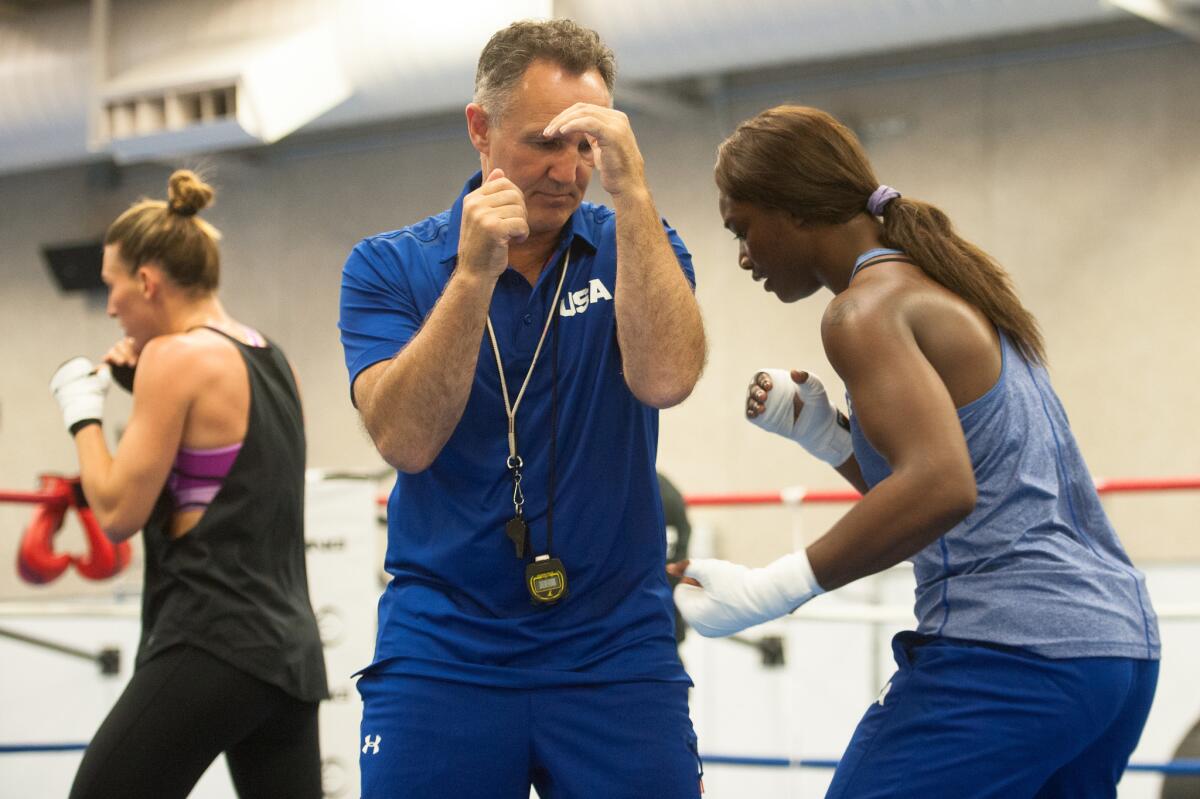Billy Walsh has U.S. boxing team fighting its way back to prominence

- Share via
Reporting from Rio de Janeiro — Boxing wasn’t invented in the U.S. But it may have been perfected there.
No country has won more world titles than the U.S., home to 13 current professional champions. Nor does any country have more Olympic boxing medals than the 111 won by the U.S.
But that second number hasn’t changed in eight years, which is where Billy Walsh comes in.
After the disastrous London Games, in which the U.S. failed to win a medal in the men’s competition for the first time in Olympic history, USA Boxing hired Walsh to turn things around. And so far it seems to be working with lightweight Carlos Balderas winning a unanimous decision Tuesday to join Nico Hernandez in the third round, giving the American men twice as many quarterfinalists in Rio as they had four years ago in England.
“Why am I here? Why am I the U.S. [coach]?” Walsh asked rhetorically. “Things weren’t going so well.”
See the most-read stories in Sports this hour >>
Just as they weren’t going well for the Irish program when Walsh joined that team as a coach before the 2004 Games. That summer in Athens, Ireland was represented by one boxer — and he lost in the second round.
But over the next 12 years Walsh guided Irish fighters, male and female, to an unprecedented seven Olympic medals and more than 50 others in European and world championship events, making the country one of the premier boxing nations in the world.
“Success builds belief,” he said with a shrug.
And failure? Well, that builds the kind of dysfunction that had unsettled a once-dominant U.S. program. After winning six medals in Atlanta 20 years ago, the Americans won just seven more in the next four Games combined.
Swimmer Michael Phelps won more than three times as many by himself.
So Walsh was hired last winter to turn that around. A genial 53-year-old with a confidence that borders on cockiness, Walsh fought as a welterweight for Ireland in the 1988 Games, losing his only bout. He’s been much more successful as a coach, one who’s more likely to wrap his arms around his fighters in a warm, familial hug than to keep them at arm’s length, as previous U.S. coaches did.
He’s been forced to start small, though. When the U.S. failed to qualify fighters for Rio in four weight divisions, Walsh was left with a men’s team of six, the smallest the U.S. has sent to a non-boycotted Olympics since 1908.
“The project is a Tokyo project,” Walsh said, referring to the site of the 2020 Games. “When I got here I realized they’re not fighting like amateurs. It’s a different game than what you guys are teaching them.
“We give them some techniques and stuff that work in this game.”
Walsh has implemented a number of changes. The boxers’ personal coaches, who were banned by the previous U.S. coaching staff, were invited in and asked to participate in preparing their fighters for the Olympics. And training camps are now longer and more frequent, frequently featuring teams from countries such as England, Azerbaijan and Morocco.
“It’s all played a big part. We’re well-prepared,” Balderas said. “I feel confident that our team is going to do very good this year because everybody’s hungry.”
A tall, lanky fighter with long arms and quick feet, Balderas is reminiscent of Oscar De La Hoya, another Mexican American fighter who burst on the scene as a 19-year-old Olympian, winning gold in 1992. And professional boxing promoters, who once scouted the U.S. Olympic team the way NFL teams scout the SEC, are hoping Balderas is just a preview of coming attractions.
“They’re on the right track,” said Richard Schaefer, former chief executive of De La Hoya’s promotion company and now head of his own company, Ringstar Sports.
“I definitely have my eyes on this small group of fighters who are over there. Some look like the total package. They know how to fight, know how to perform outside and inside the ring.”
Robert Diaz, a matchmaker for De La Hoya’s Golden Boy Promotions, agrees.
“We haven’t seen a U.S. team start off this good in a long time,” he said.
But Walsh cautions that what’s happened so far is just that — a start.
“There’s no prizes that have been given out yet. We haven’t won anything,” he said. “This is a stepping stone, a launching pad for where we need to go.”
And Walsh should know since he’s already been there with Ireland.
Staff writer Lance Pugmire contributed to this story.
kevin.baxter@latimes.com
MORE SPORTS NEWS
IOC’s handling of drug cheats puts a pall over swimming venue
Michael Phelps’ death stare breaks Internet
Go beyond the scoreboard
Get the latest on L.A.'s teams in the daily Sports Report newsletter.
You may occasionally receive promotional content from the Los Angeles Times.




